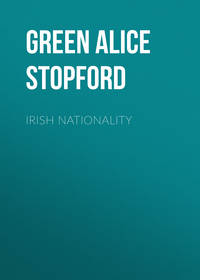 полная версия
полная версияTown Life in the Fifteenth Century, Volume 1
414
As against the idea of Merewether and Stephens, that charters of municipal incorporation only began in 1439, Dr. Gross points out that such a charter occurs in 1345, that in the time of Edward the First the technical conception of municipal incorporation was familiar, and that long before the judicial conception came into being the borough had a real corporate existence, and exercised all the functions of a corporate body. (Gild Merchant, i. 93, &c.)
415
In 1391 the Statute of Mortmain was extended to cities and boroughs. (Statutes, 15 Richard II., cap. 5.) Even when license to hold land was granted by the Crown the amount was strictly limited, and the power of refusal or of limitation was a serious consideration to the town.
416
According to Mr. Round, London found means of annexing the shire of Middlesex instead of asking to be separated from it. (Geoffrey de Mandeville, 347-373.)
417
We have a hint of a troublesome mode of interference with the municipal taxation in an incident in Norwich in 1268, when “the lord the King commanded all his bailiffs that, for a fine £10, which Margaret the Taneresse of Norwich made with the same lord the King, he granted to her such liberty that for the whole time of her life she should be quit from all his tallages in the town of Norwich … for whatsoever cause they may be made. And he commanded that they vex not the aforesaid Margaret contrary to this his grant.” (Norwich Documents, pr. 1884, 9.) In any case where the tallage was a fixed sum due from the town some one else would have to pay Margaret’s share.
418
Journ. Arch. Ass. xxvii. 478.
419
Journ. Arch. Ass. 479. Hist. MSS. Com. ix. 241-2. Statute of Maintenance, 13 Richard II., Stat. 3. For the jealousy of the towns as to any inhabitant relying for protection on a lord outside, see p. 183, note 2.
420
Journ. Arch. Ass. xxvii. 482. For a duel in Leicester in 1201, see Select Civil Pleas, Selden Society, p. 33. Judicial combat in Fordwich with an alien had to take place in the middle of the river Stour, the alien standing up to his middle in the water, while the Fordwich man apparently fought from a boat tied to the quay, with an instrument called an “ore,” three yards long. (Hist. MSS. Com. v. 442.) In 1200 “the citizens of Lincoln came and produced the king’s charter which witnesses that none of them need plead outside the city walls except the king’s moneyers and servants, and that they need not fight the duel because of any appeal.” An accused man answered the charges against him “word by word as a free citizen of Lincoln,” and “according to the franchise of the town” waged law with thirty-six compurgators. (Select Pleas of the Crown, Selden Society, p. 39.) For compurgation in Sandwich in 1493, Boys, 680.
With old forms of trial old forms of punishment were allowed to survive. In Sandwich, if a man failed to clear himself by compurgation of a charge of homicide or theft he was condemned to be buried alive in a place called the Thiefdown at Sandown. (Ibid. 465.) Felons were also drowned in a stream called “the Gestling”; but in 1313 a complaint was made that the prior of Christchurch had diverted the course of the stream, and that criminals could not be executed in that way for want of water. (Ibid. 664.) At Dover and Folkestone a thief was killed by being thrown from a cliff, and at Winchelsea was hanged in the salt marsh. (Lyon’s Dover, i. 231.) In others of the Cinque Port towns when a thief was taken his ear was nailed to a post or cartwheel and a knife put in his hand, he had to free himself by cutting off his ear, to pay a fine, and to forswear the town. In 1470, 12d. was paid “for nailing of Thomas Norys his ear.” (Hist. MSS. Com. v. 525, 530.)
421
Hist. MSS. Com. viii. 407. Nottingham retained the old usage till after the fourteenth century; Records, i. 175. Exeter till 1581; Freeman’s Exeter, 119. The question may have partly turned on the form of government adopted in the town and the work required of the common assembly in which the burghers voted.
422
It has been argued (Gneist, Constit. Communale, tr. Hippert, i. 263; v. 275) that the State created local government in the towns as a method of developing better administration, and that it was therefore only accidentally and as a secondary consequence that independence and local liberties came in the wake of this administrative system. The facts, however, of their story make it perfectly clear that municipal liberties were of natural growth, and sprang out of local needs rather than out of Court statecraft.
423
Gross, i. 23; ii. 115.
424
The seals of English towns of the thirteenth, fourteenth, and fifteenth centuries were of finer workmanship than any in Europe. They generally represented a fortress or walled town, a ship, a patron saint, or heraldic arms, but it is interesting that in no case is the figure of the Mayor used to typify the borough save in the London seal, where he stands among the corporation and citizens. Sometimes a bridge is given, as at Barnstaple; in two or three cases the Guild Hall.
425
A few towns, in the case of some members of the Cinque Ports, depended on another borough.
426
For the position of tenants on ancient demesne, see Vinogradoff, Villainage in England, ch. iii. Mr. Maitland (Select Pleas in Manorial Courts, ii. 99, &c.) gives an account of King’s Ripton, a manor on ancient demesne, whose tenants when transferred to the Abbey of Ramsey were always fighting with their new lords as to the services due from their holdings. “The privileged nature of the tenure had engendered a privileged race, very tenacious of its land and of its customs” (p. 105). The study of the way in which the customs of ancient demesne affected the later constitution of the boroughs lies outside my subject, and is therefore merely indicated.
427
Vinogradoff, Villainage in England, 89. Compare the claim of Bristol to be “founded and grounded upon franchises, liberties, and free ancient customs, and not upon common law.” (Ricart’s Kalendar, 2.) For its liberties, see p. 24-5.
428
As a matter of fact the various towns of this kind which applied to Hereford for any information as to its customs on any point had to pay one hundred shillings for the answer vouchsafed to them. (Journ. Arch. Ass. xxvii. 470.)
429
There was constant watchfulness on both sides as to their rights. In 1400 the bailiffs of Ipswich granted land for the building of a mill for the benefit of the corporation; the King’s officers declared the grant to have been made without the royal licence, and the mill was seized for the King. On the other hand, when the sheriff of the county arrested a felon in the liberties of Ipswich and put him in the King’s jail, the bailiffs required that he should be given up to them. (Hist. MSS. Com. ix. 231, 246.)
430
That is on the plea of lack of justice in the borough court. In 1401, when the citizens of Canterbury were summoned by the Crown to appear at Westminster about a breach of the statutes for the regulation of the victualling trades, they pleaded that by their charter they could not be called to answer civil suits out of their own city. (Hist. MSS. Com. ix. 167.)
431
In 1299 the amercements ordered by the Leet Court of Norwich amounted to £72 18s. 10d.; the amount accounted for by the collectors was £17 0s. 2d. (Hudson’s Leet Jurisd. of Norwich, Selden Soc. xl.) Where there was profit to be made the King was, however, always on the alert. In Piers Ploughman, Passus v., 169, he complains bitterly of the lawyers; “through your law I believe I lose my escheats!”; and it was often late before he made the mayor escheator. In 1492 two Scotch priests were arrested in Ipswich for treasonable talk, and the King granted their chattels to one of his own serjeants. The bailiffs sent the Town Clerk to Henry to represent that the forfeited goods of felons rightly belonged to the town; to which the King answered that he would not for a thousand pounds infringe in the least degree their charters, but that the community had really no right to these particular chattels, since the priests, being Scotch and not the King’s subjects, could not fairly be accused of treason, and had a perfect right to talk as they chose. On this plea he kept the goods. (Hist. MSS. Com. ix. 247.)
432
This was strictly enforced, and the town charter forfeited if the rent fell into arrears. (Madox, 139, 161-2.) The towns therefore made careful provision for the discharge of the debt, sometimes setting apart a mill or some valuable property for its payment (Madox, Firma Burgi, 251-2; Hist. MSS. Com. ix. 198-9; Nott. Rec. i. 313), or assigning certain tolls or customs; (Shillingford’s Letters, 92); or collecting it as rent from house to house. (Custumal in Hist. Preston Guild, 75.)
433
When the ferm of Carlisle was raised from £60 to £80 the citizens were granted, as a help towards its payment, all fines, inflicted by the King’s judges within their walls. (Hist. MSS. Com. ix. 198, 200.) See also Norwich Documents, 16, 17.
434
Thus the Nottingham men paid 13s. 4d. a year to Henry the Sixth, at least from 1454, for liberties granted them. There is no entry of this in the King’s accounts, and the only evidence of it is in the Nottingham Records (iii. 133). The loyal theory of Hereford was that “our goods and chattels are to be taken and taxed at his pleasure, saving unto ourselves a competent quantity for our sustentation and tuition of our city.” (Journ. Arch. Ass. xxvii. 471.)
435
Nott. Rec. i. 225, 227, 413, 421.
436
The agreement made in the fourteenth century which fixed the tenths and fifteenths for the towns at a permanent fixed sum, made it easy for the King to give over to local officials the levying of this tax without fear of injury to the Exchequer. (Stubbs, ii. 599, 600.)
437
Blomefield, iii. 137.
438
The Admiral and his deputy had jurisdiction over everything done on the sea and the great rivers up to the first bridge. (13 Richard II. St. 1, cap. 5; 15 Richard II., cap. 3; Blomefield, iii. 103; Davies’ Southampton, 239-40.) In 1487 the commonalty of Ipswich by a covenant with the King bound themselves to take surety of every owner, master, or purser of every English ship to twice the value of the ship, that the mariners should keep the peace on the sea; that if the surety by any means became less than twice the value of ship, tackle, and victuals, new security should be taken; and that the town should strive to arrest every robber and spoiler in the sea or the streams thereof. (Hist. MSS. Com. ix. 259-60.) In 1463 a charter was given to the corporation of York, constituting them the King’s justiciaries for overlooking and preserving the main rivers of Yorkshire. For the expenses and difficulties which this involved, see Davies’ York, 59-63, 82, &c.
439
As an illustration of his difficulties, see the statute allowing sheriffs and escheators to remain for four years in office, because owing to pestilence and wars there was not a sufficiency of persons to occupy these offices. (9 Henry V. St. 1, cap. 5.)
440
In the lack of officials to carry out the regulations for the control of trade a number of private people got royal letters appointing them surveyors and correctors of victuallers in various cities and boroughs, and freely used their privileges for extortion and oppression, and the taking of heavy fines and ransoms; their patents were gradually withdrawn; and in 1472 an Act was passed that all such letters and patents should be void, and that the duty of searching and surveying victuals should rest wholly with the mayor or bailiff. (12 Edward IV. cap. 8.)
441
In this matter the King was not allowed to interfere. In 1489 there was a dispute in Leicester between the Town Council and the Commons about the election of a Mayor. The matter was referred to the King, who issued a precept under the seal of the Duchy of Lancaster, showing that it was as Lord of the Manor and not as King that he interfered. He set aside both candidates and reappointed the last Mayor. The next year the question was settled by Act of Parliament. (Thomson, Mun. Hist., 84.) For authority exercised by Parliament see Norwich (Doc. Stanley v. Mayor, &c. 30.) When the citizens applied in 1378 to the King and Council for a renewal of their ancient liberty that no stranger should have power to buy or sell by retail, they were answered that it would not be valid “without Parliament”; they therefore pray for a grant by charter.
442
See Hudson’s Leet Jur. in Norwich, Selden Soc. xxvii. xc. “For he doth represent to us the body of our King.” (Journ. Arch. Ass. xxvii. 462.) See the proclamation of the London Mayor: “We do command, on behalf of our Lord the King, that no dyer or weaver shall be so daring,” &c. – ”Memorials of London,” p. 309. An illustration of how the King’s law and the town law ran side by side may be seen in the fines for the breach of certain rules, as, for instance, the rule against liveries, which had to be paid both to the King and to the town. (English Guilds, 388-9.)
443
Piers Ploughman, Passus ii. 156, 157.
444
Warkworth’s Chronicle, 2.
445
See Gross, ii. 245.
446
The instances of similar grants made to various towns at almost the same date are too numerous to give, but they would form a striking list.
447
Charter of Lincoln the same year; that of Winchester, 1190. (Stubb’s Charters, 257-8). Nottingham and Northampton in 1200 (ibid. 301-3). The system of government adopted at Norwich was followed or imitated a little later by the neighbouring towns of Yarmouth and Colchester.
448
Norwich Doc. Stanley v. Mayor, &c. p. 3. In the great majority of cases this grant was made once for all; but occasionally it was renewed from time to time. Thus Henry the Sixth in 1437 gave the mayor and burgesses of Bristol a lease of the town and its profits for a term of twenty years. In 1446 he granted a new lease for sixty years. In 1461 Edward the Fourth renewed the lease, not for a term of years, but for ever. (Seyer’s Charters of Bristol, 105.) The ferm was granted in the same way for a term of years in the case of Dunwich, a royal town, where it was let out to the highest bidder. Here, however, the collection of rent was peculiarly uncertain from special circumstances (Madox, 235-8, 241); and in 1325 Dunwich, ruined by the filling up of its port, prayed to have the town taken into the King’s hand and a guardian appointed. (Rot. Parl. i. 426.) For the inconvenience of this letting out to the highest bidder, see Madox, 251.
449
Hudson, Municipal Organisation in Norwich, 20; Leet Jur. in Norwich, Selden Society, xvi. lxxii.
450
Hudson’s Notes about Norwich, Norfolk Arch. vol. xii. p. 25.
451
In 1288 the four bailiffs presided over the courts of these leets. (Hudson, Municipal Organisation, 16, 21.)
452
Norwich Doc., Stanley v. Mayor, &c., p. 5.
453
Ibid. 6, 8, 10. Blomefield, iii. 46, 62.
454
The convent sided with De Montfort. For the state of affairs in the city, see Blomefield, iii. 52, &c.
455
Blomefield, iii. 49.
456
Norwich Doc., Stanley v. Mayor, &c., 7.
457
Norwich Doc., Stanley v. Mayor, &c., 16, 17.
458
Ibid. 10-12.
459
This meant that it was the town bailiff who was to return the certificate of what he had done in execution of a writ addressed to him, instead of this being returned, as formerly, by the sheriff.
460
Norwich Documents, 16, 18.
461
Norwich Documents, 25.
462
Ibid. 26.
463
Blomefield’s Hist. of Norfolk, iii. 103.
464
Ibid. iii. 81, 94-5. In 1393 the corporation was granted shops and houses held of the King and worth £10 yearly, the profits of which were to be spent on repairing the walls and towers. For this licence they had to pay the King £100. Norwich Documents, 32.
465
Ibid. 33-37.
466
Gross, i. 240-267.
467
Report on Municipal Corporations, 1835, pp. 16-17. Gross, i. 94, note 1.
468
This change was evident from the time of Richard the Second, when the powers of the Justices were rapidly enlarged. See Statutes, 12 Richard II. cap. 10; 13 Richard II., 1, cap. 8; 13 Richard II., 1, cap. 13; 13 Henry IV. cap. 7; 2 Henry V. cap. 4; 2 Henry V., 1, cap. 8; 2 Henry VI. cap. 12; 2 Henry VI. cap. 14; 2 Henry VI. cap. 18; 6 Henry VI. cap. 3; 18 Henry VI. cap. 11.
469
Southampton, Hist. MSS. Com. xi. 3, p. 104. Cases of interference occur in the unpublished records of Coventry. For Romney see Lyon’s Dover, 313. In 1489 there was some such trouble in Leicester (Thompson, Mun. Hist., 84). And in 1512 there is another instance in Nottingham (Records, iii. 341-2). From the time of Richard the Third there seems evidence of the growth of a new anxiety in the central government about the democratic movement in the boroughs, and a determination to reserve power in the hands of a small corporation. An earlier instance may perhaps be found in the Exeter quarrel from 1477 to 1482 (English Guilds, 305, &c.); and in York in 1482 (Davies, 122-4).
470
There were many cases in which a town’s privileges were forfeited, whether for arrears of rent (Madox, 139, 161-2) or for other causes (154-5, 157). The franchises of Nottingham were twice forfeited for some unknown cause – in 1283 for three years (Records, i. 56), and in 1330 for a short time. (Ibid. 102.) In the same year Edward the First seized the franchises of Derby because of exactions of the Merchant Guild, but restored them on payment of a fine. (Gross, ii. 53.) For the case of Sandwich (Boys, 661, 676). Ipswich charter withdrawn, 1285; regranted, 1291. (Hist. MSS. Com. ix. 230, 239, 243.) Chester in 1409. (Hemingway’s Chester, i. 137.) The liberties of Carlisle were forfeited for a short time for some irregularity in the town courts in the thirteenth century. (Gross, ii. 38.) Southampton lost its freedom in 1276 and 1285, and again in the next century for letting the French into the town. (Davies’ Southampton, 33, 35, 79.) Norwich suffered several times; for its attack on the Priory in 1272; for an accusation of having exceeded its powers in punishing crime in 1286; for riots about the election of mayor in 1437; and for Gladman’s insurrection in 1443. (Stanley v. Mayor, &c., Norwich Doc., 9-12. Proceedings, Privy Council, v. 45. Hist. MSS. Com. i. 103.) In these cases a royal officer was appointed to rule the town; and the complaint of Scarborough, when Edward the Second in 1324 deprived it of the right of direct payment to the Exchequer, shows how a town suffered when its ferm was leased out. (Rot. Parl. i. 423.) The loss of liberty was always temporary, lasting from a few months to five or six years, and had no political significance as in France, where it formed part of a settled policy and had results which to the English mind seem of peculiar importance in the history of constitutional development.
471
Gross, ii. 235-243.
472
Occasionally a borough was granted to a great noble or court favourite; but more commonly as time went on the grant merely meant giving a charge on the rent of the town. Thus before 1339 Preston had been granted at various times to neighbouring lords. In 1361 John of Gaunt held the manor, but long before this the rights of the lord were so reduced that they are practically never mentioned in the history of the town. (Hewitson’s History of Preston, 7-8.) For the troubles to which the nobles’ claims to rent might lead, see Davies’ Southampton, 112. Edward the Fourth granted the ferm of Bristol to the Queen for her life. The treasurer of the King’s chamber declared it had been assigned to him in payment of a debt and brought an action for it against the Bristol sheriff. Bristol proved the money had been paid to the Queen and gained the case, 1465. (Madox, 227-8.)
473
In 1273 Henry de Tracy held the borough from the King in chief at a ferm of about £5 14s. 2d. There were 36 tenants whose rent amounted to 23s. 8d. and some tenants in a suburb who paid an uncertain rent, but generally about 6s. 8d. A market was held every Friday which yielded in tolls to the lord about £3 a year, and a yearly fair gave 10s. Fines, reliefs, &c., came to about 13s. 4d. a year. The wealth of the town increased after the building of the “Long Bridge” in 1280 over “the great hugy, mighty, perylous, and dreadful water named Taw,” and the increase of the cloth trade about 1321. Towards the close of the fourteenth century the legacies and accounts show that the burghers were laying up considerable wealth and doing a thriving trade. Hence probably the dispute as to the claim to profits. Hist. MSS. Com. ix. 206-213. See also case of Bridgewater, ibid. iii. 310-14.
474
They even claimed the right of infang theof and outfang theof, and to be impleaded only in their own court. Hist. MSS. Com. ix. 206.
475
Rich. Redeless, ed. Skeat, Early English Text Society, Text C, Pass. iii. 177, &c.
476
Book of Precedence, E. E. Text Society, 105-108. Langland in Richard the Redeless describes the noble who “keepeth no coin that cometh to their hands, but changeth it for chains that in Cheap hangeth, and setteth all their silver in samites and horns;” and
“That hangeth on his hips more than he winnethAnd doubteth no debt so dukes them praise.”Richard the Redeless, Passus iii. 137-40, 147-8.477
Journ. Arch. Ass. xxvii. 467. Nott. Rec. ii. 425.
478
The landowner of the fifteenth century was usually a mere landlord subsisting on his rents and not interested in the produce of the soil except as a consumer. He was only occasionally a trader. (Rogers’ Agriculture and Prices, iv. 2; see Berkeleys, i. 365-6; ii. 23; Paston, i., lxxxviii-ix., 416, 430, 431, 454; ii. 70, 106; iii. 430; Hist. MSS. Com. viii. 263; iv. 1, 464.) The really important classes were the new proprietors who rented land for trading purposes.
479
See Fastolf, Paston Letters, i. 187-8.
480
Treasures were apparently stored in different quarters for greater security. See Fastolf’s stores at Caistor. (Paston Letters, i. 416, 473-475; S. Benet’s, 468, 508; S. Paul’s, London, 493; Bermondsey, 474; White Friars, Norwich, ii. 56.) The religious houses had their reward in the form of benefactions for which masses were sung for the donor. (Hist. MSS. Com. iv. i. 461.) In the Paston house there was stored away over 16,000 ounces of silver plate, nearly 900 yards of cloth, about 300 yards of linen, and coats and hats without number. See also Hist. MSS. Com. vii. 537; viii. 93; Berkeleys, ii. 212. Plumpton Corresp. 10-11, 13, 37.




